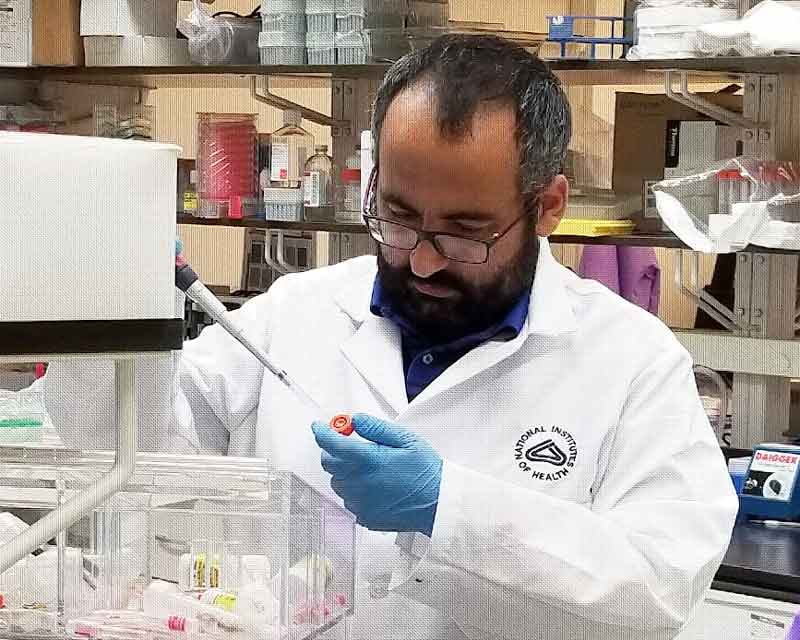
Researchers combine nanobiotechnology, neutrophils and nucleic acid to combat lupus
 Munir Akkaya, MD, DPhil, explores how B cells develop, differentiate
Munir Akkaya, MD, DPhil, explores how B cells develop, differentiateOut of all interventions that affect human health, vaccines make the greatest impact, says Munir Akkaya, MD, DPhil, assistant professor and researcher in the Department of Internal Medicine’s Division of Rheumatology and Immunology at The Ohio State University College of Medicine.
“All vaccines currently in use depend on their ability to induce B cells to make high affinity, long-lived antibody responses,” Akkaya says. “Understanding the mechanisms underlying B cell activation will clearly benefit vaccine design and development.”
After arriving at Ohio State in July 2021 from the National Institute of Allergy and Infectious Diseases in Maryland, Akkaya is setting up his lab at the Davis Medical Research Center.
“I’m interested in understanding the mechanisms that regulate B cell differentiation in the context of proper immune response to infection or immunization and also autoimmunity,” Akkaya says.
Though he holds a medical degree, Akkaya prefers to focus solely on biomedical research. While earning his PhD at the University of Oxford, Akkaya studied pathogens and immune system.
His postdoctoral work at the National Institutes of Health (NIH) followed the molecular contexts of infection and immunity. He developed models of malaria and other viruses in animals to study how immunity develops and changes.
Today, Akkaya’s chief focus is on the immune system’s B cells. Specifically, he looks at:
“I’m deeply interested in metabolic changes inside the cell as they fuel the rapidly proliferating immune response,” Akkaya says.
Akkaya studies change in the immune response under non-ideal conditions. He’s working on obesity and diet and the influence these conditions have on baseline immunity and the development of B cell immunity.
More specifically, his research follows the interactions between different B cell activation modalities and how these signals collectively determine B cell fates. He investigates the impact of Toll-like receptors (TLRs) on the outcome of antigen-specific activation through the B cell receptor (BCR). His research on host-pathogen interactions has focused on the impact of humoral immune responses in malaria.
Akkaya holds a long-standing research interest in the dynamics of host-pathogen interactions. Recently, he led a broad investigation that described novel virulence factors Plasmodium parasites use to evade immune responses. This research characterized a novel function for a rodent Plasmodium berghei ApiAP2 transcription factor and showed that a single nucleotide polymorphism in ApiAP2 was sufficient to alter the development of host B cell immunity.
Akkaya’s lab studies adaptive immunity and immunoregulation in the context of autoimmune diseases and cancer.
The Akkaya Lab also will combine efforts with Billur Akkaya, MD, DPhil. The husband-and-wife team worked together at the NIH, and their students often collaborated with one another on research. Billur, who works at The Ohio State University Wexner Medical Center, is an immunologist who studies T cells and their role in multiple sclerosis and neuroimmunology. Both B and T cells play a role in immunity.
“We want to do that here because it broadens our perspective when we work jointly,” Akkaya says.
Billur’s T cell work researches ways to uncover specific targets for precision therapies to treat autoimmune disorders and cancer. Regulatory T cells (Tregs) protect the body from autoimmunity but can also promote tumor progression by restricting anti-tumor immune responses. This makes Tregs an attractive, yet risky, treatment target. Her lab studies the molecular machinery underlying interactions of Tregs with antigen presenting cells and how Tregs mediate their inhibitory functions.
By working with his wife’s lab, Akkaya made two novel, complementary observations on the influence of TLRs on B cell functions. He demonstrated that simultaneous signaling through the BCR and TLR9 enhanced B cell proliferation, differentiation and cytokine secretion while dramatically reducing the ability of B cells to capture, process and present antigen to antigen-specific helper T cells. These findings suggest that TLR9 stimulation may render B cells less efficient and skew their differentiation toward rapidly proliferating short-lived plasma cells or memory B cells.
Mentoring others is a big part of Akkaya’s professional career. At the NIH he worked with many post-baccalaureate, college and high school students who attended various NIH programs. These opportunities give students the chance to work for a gap year and spend time developing and strategizing their research skills. The experience and chance to publish provides an edge to these students and their advanced program applications.
At Ohio State, Akkaya looks forward to partnering with undergraduate, graduate and PhD students who want to do research at all different levels. He especially enjoys providing guidance and opportunities to students from underprivileged backgrounds and wants to further his mentoring to help others, based on how much they want to engage in research.
One of the students Akkaya mentored at the NIH was a refugee from Africa.
“She’s now in one of the leading pharmacy schools in the country and that was her dream,” he says. “I’m happy to have contributed a bit to her experiences.”
The Ohio State University’s growing diverse medical and research community attracted Akkaya to the Wexner Medical Center. Recruitment efforts across the nation and abroad and investments in new facilities and infrastructure were hard to ignore.
“This is a place that’s growing fast but is also a collegial place with like-minded people,” Akkaya says. “Everyone I talked to during my interview process shared what a great environment this is for collaborating with other scientists and physicians and clinical researchers.”
Many things attracted Akkaya – and his family – to make the move to Columbus. His wife, Billur, also took a job as an assistant professor and researcher in the Department of Neurology at Ohio State’s Wexner Medical Center.
The Akkayas also have two children, ages 8 and 10. The whole family was recruited.
“This is a great place to raise kids,” Akkaya says. “It’s affordable and modern, homes are spacious and there is access to everything.”
Just a few months into his first year, Akkaya sees many opportunities for developing his scientific career and managing professional growth for himself and his students.
“We have access to state of the art equipment and large cohort of patients,” Akkaya says. “I think my research will flourish here and the mentorship I’m already receiving as a new faculty member makes me feel part of this community.”